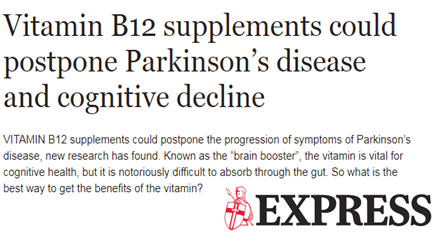HYPE?
Media portrayal:

HOPE?
Scientific interpretation:
The jury is still out on disease modifying effects of Vitamin B12
Original article: Vitamin B12 and Homocysteine Levels Predict Different Outcomes in Early Parkinson’s Disease, Movement Disorders: May 30, 2018.
The takeaway
Findings from an analysis of a large group of newly diagnosed patients enrolled in the DATATOP trial indicate a potential relationship between vitamin B12 levels and measures of stability and walking capacity. More work is still required to address the open question of whether B12 supplementation has the potential to slow down symptom progression.
Why is it important?
This study is the first to report that lower B12 levels might be linked to worse posture and walking ability early on in Parkinson’s, indicating that more work will likely follow in this area.
%
IMPACT
- Novelty 60%
- Proximity 70%
- Deliverability 70%
Impact Opinion
This study highlights the importance of good nutrition in people with Parkinson’s. While the evidence supporting an association between PD and vitamin B12 deficiency is limited, the findings that those with low B12 levels at the time of Parkinson’s diagnosis went on to have worse postural stability and gait issues is a useful take away finding. And this is an element of Parkinson’s that the community can control via vitamin supplementation.
Background
Vitamin B12 is important for every cell in the body, but especially so for red blood cells and neurons. Our ability to absorb B12 deteriorates as we age. B12 deficiency can cause instability, tingling and numbness as well as confusion, which are sometimes also seen in Parkinson’s. Some smaller patient studies have found that neuropathy and cognitive impairment are associated with low B12 levels. This study investigated what proportion of newly diagnosed, untreated people with Parkinson’s who also had low B12 levels, and whether their symptom progression was affected by this.
The details
The researchers analysed stored blood samples from the DATATOP clinical trial (see below), which enrolled newly diagnosed patients in 1987-1988, to assess the effects of selegiline and/or Vitamin E supplementation, compared to placebo. Participants were not allowed to take any other supplements except a standard optional multivitamin offered by the trial team. Clinical measures were taken at regular intervals to track symptom progression.
Using samples from 680 patients almost 20 years later, these researchers found that 5% were B12 deficient on entering the study. They ranked patients according to B12 level, ranging from low to high, into 4 subgroups. This analysis showed that by the end of the study, symptoms related to freezing, walking, gait and postural instability were worse than those in the lowest B12 subgroup (bottom 25%).
Although the sample was large, interpreting this finding is not straightforward. Determining B12 deficiency accurately is complex and to obtain a reliable measure, an additional substance must be measured, homocysteine. If this is taken into account, just 2% of the sample were truly B12 deficient. In addition, some of these patients were receiving the treatments that were trialled in the DATATOP study. Also, overall B12 levels for the whole cohort were higher at the end of the trial, possibly due to the optional multivitamin. Although B12 deficiency is important and must be corrected by supplementation, another large study did not find it increased risk for Parkinson’s. More work is needed for a definitive answer.
Next steps
A randomized, placebo controlled trial on the effects of B12 supplementation is the next step to understanding whether this vitamin has an effect on disease progression.
Related work
Cardoso, F. (2018). Vitamin B12 and Parkinson’s Disease: What is the relationship? Mov Disorders. doi: 10.1002/mds.27366
de Lau, LM, Koudstaal, PJ, Witteman, JC, et al. (2006). Dietary folate, vitamin B12, and vitamin B6 and the risk of Parkinson disease. Neurology, 67:315-318.
DATATOP trial – https://www.ncbi.nlm.nih.gov/pubmed/2508608
Where can I learn more?
More information on this work
https://www.michaeljfox.org/foundation/grant-detail.php?grant_id=1228
Shen, L. (2015). Associations between B Vitamins and Parkinson’s Disease. Nutrients;7:7197-7208.
Original article: Christine CW, Auinger P, Joslin A, Yelpaala Y, Green R; Parkinson Study Group-DATATOP Investigators: May 30, 2018, Vitamin B12 and Homocysteine Levels Predict Different Outcomes in Early Parkinson’s Disease, Movement Disorders.



